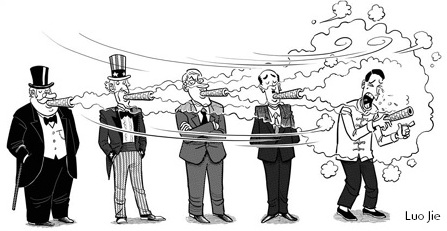Will we depreciate or appreciate Earth?

Climate change is just the tip of the iceberg. To avoid doing a global financial titanic tumble, the major underlying threat both to the environment and economy needs to be recognized, which was not discussed in Copenhagen. That threat is the old industrial development model of accounting costs of only things that are counted in the market.
Dumping industrial emissions in a cumulative bulk of trillions of tons of greenhouse gases for free is what seriously changes climate. And if governments just try to put the lid on emissions, if bankers extrapolate the old development model and assume borrowers should make profits, and economists egg on breakneck consumption, defaults will, as they have, continue to snowball. Climate change conferences from Copenhagen to Mexico and the global financial crisis from Wall Street to Dubai are manifestations of the same human quirk to cheat on reality.
Criticism of the old economic model was not a hot topic in Copenhagen. It is not a topic for chemists counting carbon, or geographers monitoring glaciers, or NGOs tweaking temperatures. Economists do not get it, and business people do not want to hear about it. The least likely to mention it are politicians dependent on votes. Much of the Copenhagen conference was posturing, vanity and rhetoric, and it ended with just a token accord. There was no owning up that all users have to pay the costs for all goods and services produced, including the cost of depreciation of the environment.
Ecological depreciation is an emerging concept. A team of scientists, led by Robert Costanza, has refuted what founding economist David Ricardo had written in 1817, that natural resources are abundant and free. Costanza's team cautiously and humbly, and to their own shock, calculated in detail that the annual value of the Earth's ecological services, in the purifying and refreshing cycles of water and air, are about double the global GDP. That is, we take from nature twice as much as we give.
For the last two centuries crises in industrial pollution have been resolved through a distinct pattern: Keep the benefits of development, including fine products and profits, but move the dirty processes somewhere far away where less developed economies are eager for jobs. The pattern from the West (Old World) to the New World and then to the East is captured in 1975 lyrics of the Eagles (The Last Resort), when rich men came and raped the land, to satisfy our endless needs and justify our bloody deeds, concluding after the pillage eastward, there is no more new frontier, we have got to make it here. So it is hypocritical for Britain's climate change secretary to accuse China of spoiling the plan in Copenhagen to dismiss their centuries of industrial pollution.
The step-by-step dirtying of one's own yard and then passing it on has ended with China left holding the can. This makes China much more eager for a new and progressive, and yes, transparent, scientific and reasonable paradigm. After three decades of showing how good they are at using the old model, the resilience of the environment has tipped over to fragility, and the future could be disastrous if continued.
Just before going to Copenhagen, China showed the world that it would not fool around with posturing, and unilaterally undertook to rein in emissions at a rate too rigorous for the West to attempt. In the new concept of scientific economic development, and in new efficient technologies, China has confidently leapfrogged the West.
China's 5,000 years of history has taught what depreciated resources means. Take the plains along the Yellow River, once the cradle of civilization founded on rich agriculture, which has almost turned into desert. When agronomist, Prof H. King, came to China early last century, he marveled at the evolved wisdom of farming, recycling, harmony of cropping, energy efficiency (Farmers for Forty Centuries, 1911). But it took another rocky century for China to find its way in the world of industry.
The first photograph of the Earth was taken from space in 1966, prompting Kenneth Boulding to pen a poignant essay, Spaceship Earth. He mused the finiteness of our resources, hurtling though a vacuum. It seemed the Industrial Revolution had run its time from the Old World to the New World and on to the Asian Tigers and the globe had hit the wall of choking in its own pollution.
Ironically, the 9.6 million-sq-km country of China with 1.3 billion people was not in the market at that time, finding its own way out of humiliation from Opium Wars, colonial bullying and Japanese invasion.
Just when global industrial development seemed to have smothered itself, China opened up and took on the role of "sweatshop of the world" and for almost three decades absorbed all those downsides in order to rise out of poverty. In doing so it lived the Eagles lyrics of no new frontier and having to make it here. China was the first to throw off the old industrial development model, elevate its environment agency to full ministerial powers, unilaterally reduce emissions, and enthusiastically pioneer renewable energy. It now leads the world in wind and solar energy and biofuels.
The biosphere is hard to get your head around. Try this as a thought exercise: The Daoist twirl symbol, not as simple as depicted, but as an intertwined twirl within a three-dimensional onion peel, just from diameter 12,740 km to 12,760 km. This represents our biosphere where we fly high and drill deep. It is not thick as an onion peel, relatively, but the skin of an apple. That is a starting point for appreciating the swirls of basic compounds in fluid motion around our biosphere - oxygen, carbon dioxide, water, and how they interact with soils, plants and animals.
Messing with those intricate cycles, burning about 18 billion tons of fossil fuels a year, is a cost we cannot afford.
The concept that people must harmonize with nature is not some novel fashion, but runs deep and eternal in Chinese philosophy. China preempted the weak accord at the Copenhagen conference with its own voluntary guarantees and will lead the world in a development model that does not try to conquer nature, and does not convey its wastes to other places, or borrow when it cannot pay back.
The author is an Australian researcher collaborating with Chinese academic and commercial institutions.

(China Daily 12/23/2009 page9)














